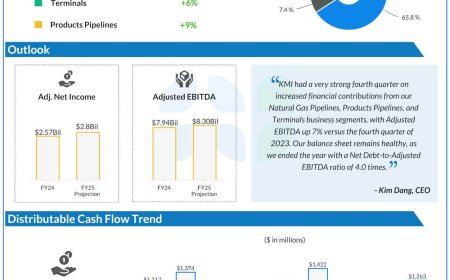Analyzing the Effects of Inflation on International Financial Relations
Inflation is a term that represents the increase in prices of goods and services in an economy over time. It has implications about how much money can buy, thereby changing the aspects of life as well as business operations. An increasing inflation reduces the purchasing power of money. Such conditions can cause waves, more so […] The post Analyzing the Effects of Inflation on International Financial Relations appeared first on Insights Success.

Inflation is a term that represents the increase in prices of goods and services in an economy over time. It has implications about how much money can buy, thereby changing the aspects of life as well as business operations. An increasing inflation reduces the purchasing power of money. Such conditions can cause waves, more so in the financial interaction between countries regarding how such countries relate with one another economically. Most of the relations among them have their dimensions influenced by inflation in terms of trading, investing, exchange rate, and general stability.
Understanding Inflation
When the demand for goods or services surpasses its supply, there is said to be an inflation. More than one factor contributes to this mismatch. For example, when consumers desire something more than what is produced, its price rises. Moreover, costs may increase if the prices of raw materials, labor, or transportation become higher. Central banks normally react to inflation by revising interest rates. When interest rates are high, spending and borrowing tend to decrease, which may be able to slow down inflation.
The situation concerning inflation is not uniform in every country. While some have high inflation rates, others are stable. This varies the effects of inflation in financial relations between countries.
Effect on Trade
Another very crucial mechanism in how inflation influences international financial relationships is the trading process. The value of a nation’s products and services may be highly increased compared to its other competitors. Due to the change, its competitiveness as an exporter would diminish, and the nation might suffer due to an eventual demand reduction for expensive commodities against cheaper ones produced by its competitors.
Conversely, countries with low inflation rates may have their exports in higher demand. They can sell their products at cheaper prices, hence more attractive on the global market. This can flip the trade balances and shift the economic health of the nations.
Also, as inflation impacts currency values, it can complicate trade agreements. When the currency of one country loses value as a result of inflation, it might change the terms of trade, and sometimes disputes may arise or have to be renegotiated.
Investment Effects
Again, this investment field is influenced by inflation levels. Investors prefer a less inflationary economic environment that will give them the certainty to make long-term choices. A high inflation environment can cause uncertainty and present risks for investors. Higher inflation may deter foreign direct investment if the country, in which the investor hopes to invest, is likely to increase its inflation to a higher level.
When inflation is high and unpredictable, investors may seek safer alternatives, diverting their capital to countries with more stable economic conditions. This shift can impact the inflow of foreign direct investment, which is crucial for economic growth and development in many nations.
In addition, inflation can discourage domestic investment too. Companies may not invest in new projects when they are not sure of future costs and returns. This hesitation can slow down economic growth, creating a vicious cycle of declining investment and rising inflation.
Currency Exchange Rates
Another significant effect of inflation on international financial relations is in currency exchange rates. In the event that one country has higher inflation than another, its currency will be devalued compared to the other. This may lead to changes in the exchange rates of countries involved in international transactions.
A weak currency will make imports expensive but may boost exports because foreign buyers will find the imported goods cheaper. However, it will increase the price of imported goods for dependent countries as they have to pay more to obtain their foreign products. This tension may create friction between the nations involved, especially when one country feels that another is gaining at its expense.
Moreover, changes in exchange rates can influence international loans and debts. For example, if a country has debt in foreign currency, a devaluation of its currency due to inflation can make repayment more challenging. This situation can lead to financial distress, affecting the country’s creditworthiness and ability to access future financing.
Economic Stability and Cooperation
High inflation would undermine overall economic stability that is very crucial for sound international financial relations. When the inflation level in countries is high, citizens can be faced with social and political unrest as a result of the high cost of living. Such unrest results in unstable governments and policies, making countries less appealing partners for trade and investments.
Countries may look to strengthen their cooperation with others in response to economic instability. Multilateral organizations and agreements can help to reduce the impact of inflation by promoting economic collaboration. For example, countries may enter into trade agreements to stabilize prices or offer support during periods of high inflation.
Secondly, it helps in taming inflation through concerted action by the central banks. In a collective effort, countries can learn from one another and adopt strategies for curbing the inflationary trend to achieve more stable economic relationships.
Conclusion
In brief, inflation greatly impacts international financial relations because it influences trade, investment, currency values, and economic stability. High inflation can prove a hindrance to the country, as it results in reduced competitiveness in international markets and deters investment. Fluctuations in currency exchange rates add another layer of complexity, affecting international transactions and economic agreements. Ultimately, understanding the effects of inflation is critical for countries aiming to maintain healthy and cooperative financial relations on the global stage. Addressing these challenges through collaboration can foster a more stable economic environment, benefiting all nations involved.
The post Analyzing the Effects of Inflation on International Financial Relations appeared first on Insights Success.











































